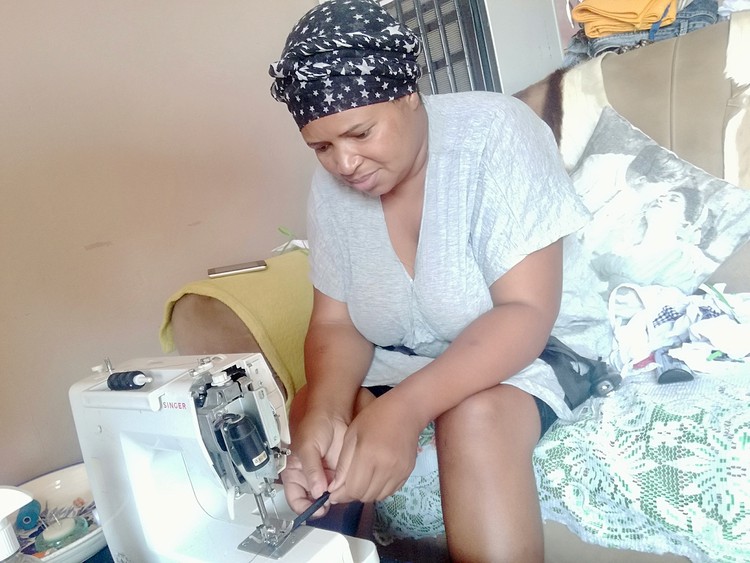
Samela Matiso sews homemade masks which she sells for R15 in KwaNobuhle, Uitenhage. Photo: Thamsanqa Mbovane
15 April 2020
Government recommended and endorsed the use of masks on 10 April to help disrupt the spread of Covid-19. With a huge shortage of surgical and N95 masks, which are reserved for health workers, a number of enterprising people have now got into the homemade face mask business.
“First I started sewing for my extended family, seven people to be precise … and I then made masks for myself and for my three children too,” says Samela Matiso of KwaNobuhle, Uitenhage.
“When my neighbours saw us in the yard or going to the nearby shop to buy goods, they eagerly wanted masks for themselves too,” she says.
Matiso had been running a tailor business for 18 years. She makes about 50 masks a day. She sells them for R15 each, marketing through Facebook and Whatsapp.
“My customers come from not only KwaNobuhle, but also in KwaLanga … and others come all the way from Port Elizabeth,” she says.
Matiso serves people through her burglar gate and puts sanitiser on her customers’ hands before exchanging any cash.
“It’s good to keep a distance from each other and protect one another because we don’t know who might have the virus,” she says.
Ndileka Tumana, a customer, says: “I bought several different masks, which come in different colours, for all my family members.”
Fashion designer Sandile Mngadi making cotton face masks. Photo: Zimbili Vilakazi
In Durban, fashion designer Sandile Mngadi from K Section, Umlazi, has also started making masks.
“I went through the internet and searched how other countries tackled the problem of N95 and surgical masks scarcity. That’s when I discovered that they also resorted to cotton masks,” he says.
He advertised on Facebook and WhatsApp. “The response I got was overwhelming. Scores of people started placing orders.”
The masks he makes are three-layered and they are reusable.
“I always advise my clients to wash and iron it daily after using it,” says Mngadi.
“I’ve done a number of donations to families especially in my neighbourhood. If I find out that a certain resident needs the mask but cannot afford to buy it, I give it to him or her without expecting payment in return. I also give out extra to those who buy in bulk. For example, if I get an order of ten masks, I add five more and tell the client to donate the extra masks to those in need around their area,” says Mngadi.
He says a mask takes him about 20 minutes to finish.
The National Institute for Communicable Diseases recommends:
A mask is no guarantee against contracting Covid-19. In fact, home-made masks are more effective at preventing you from spreading your germs to other people. It’s a way of showing that you are taking responsibility. Besides wearing a mask you should still stick to all the other social distancing measures.